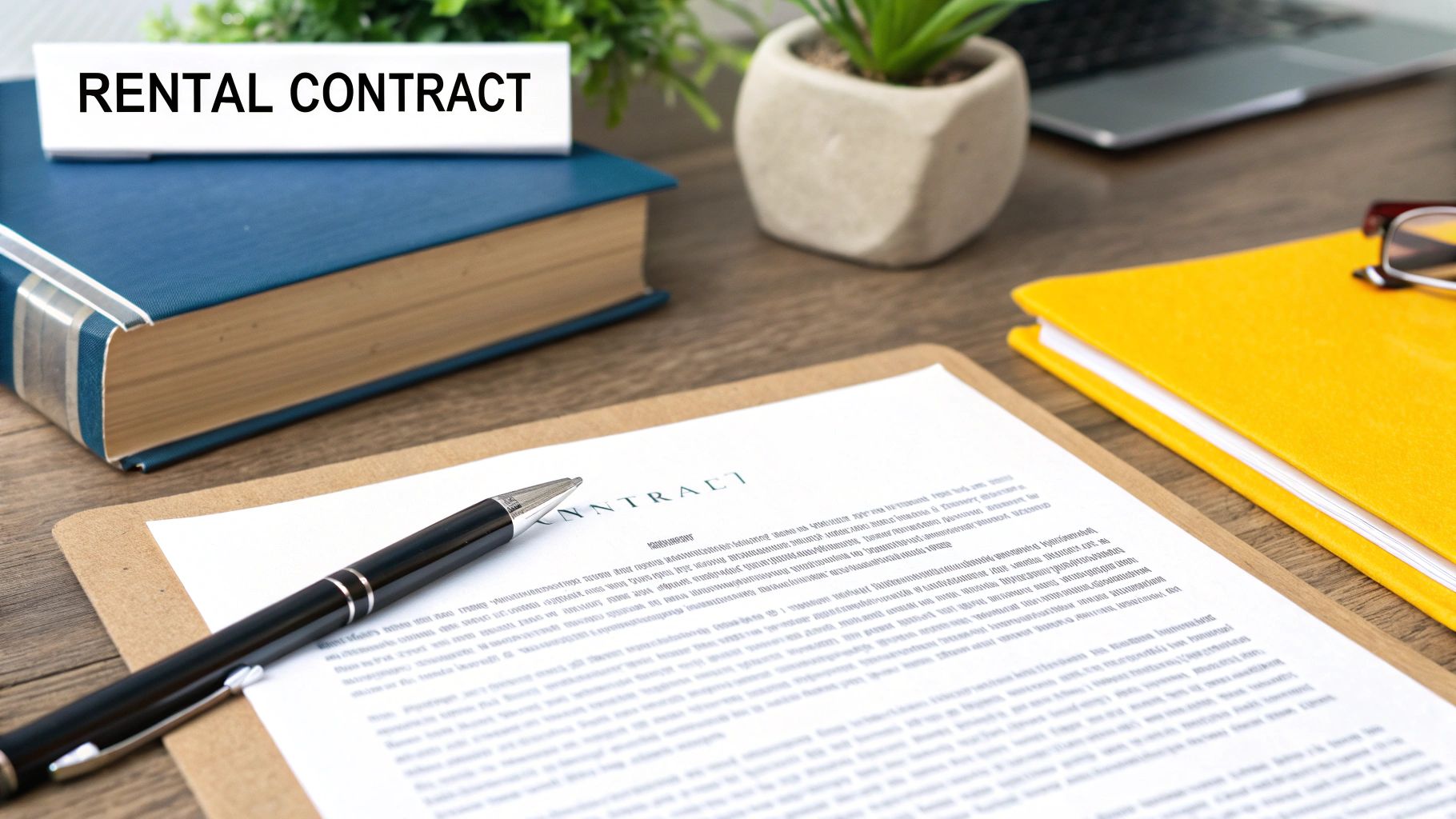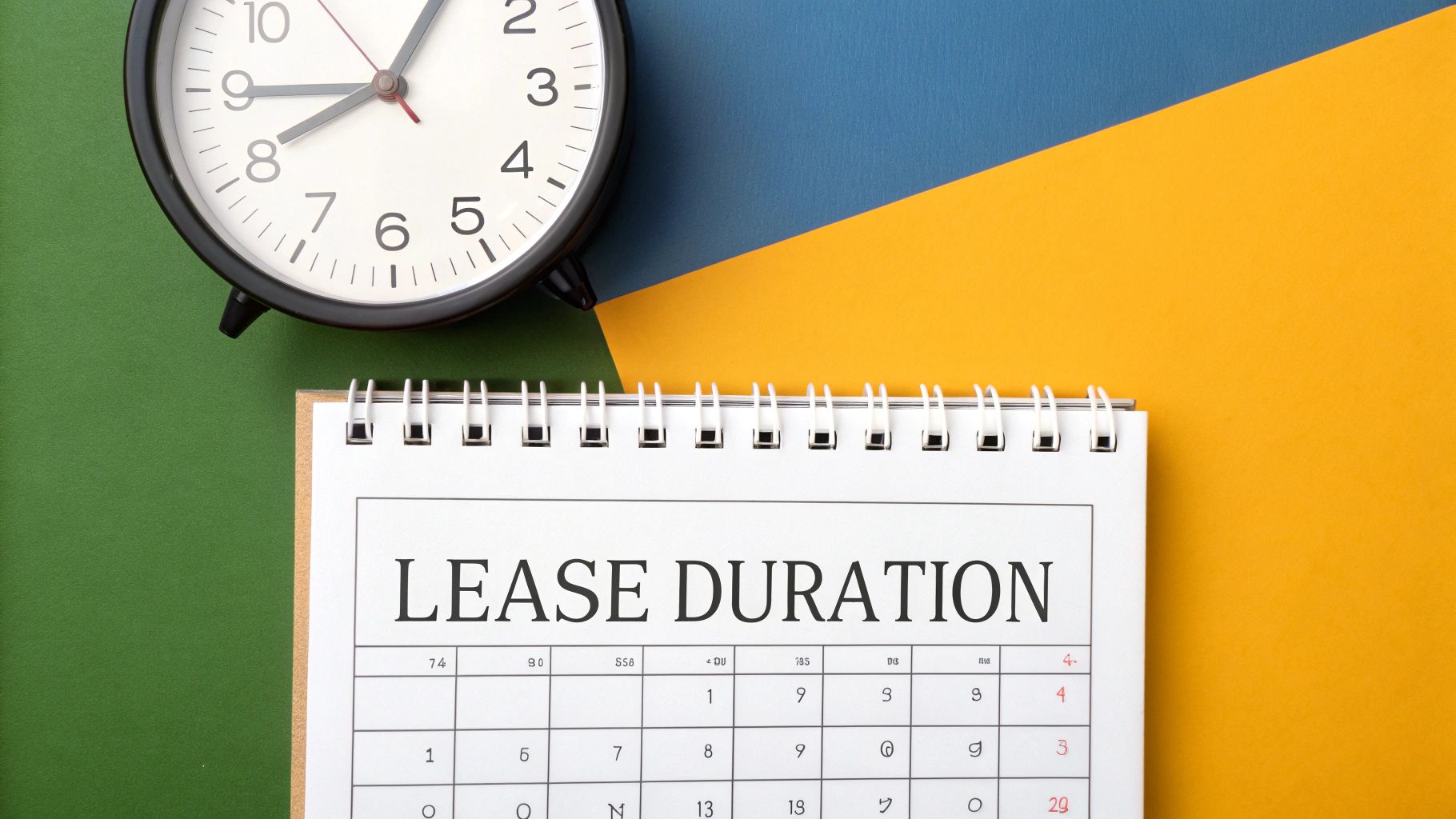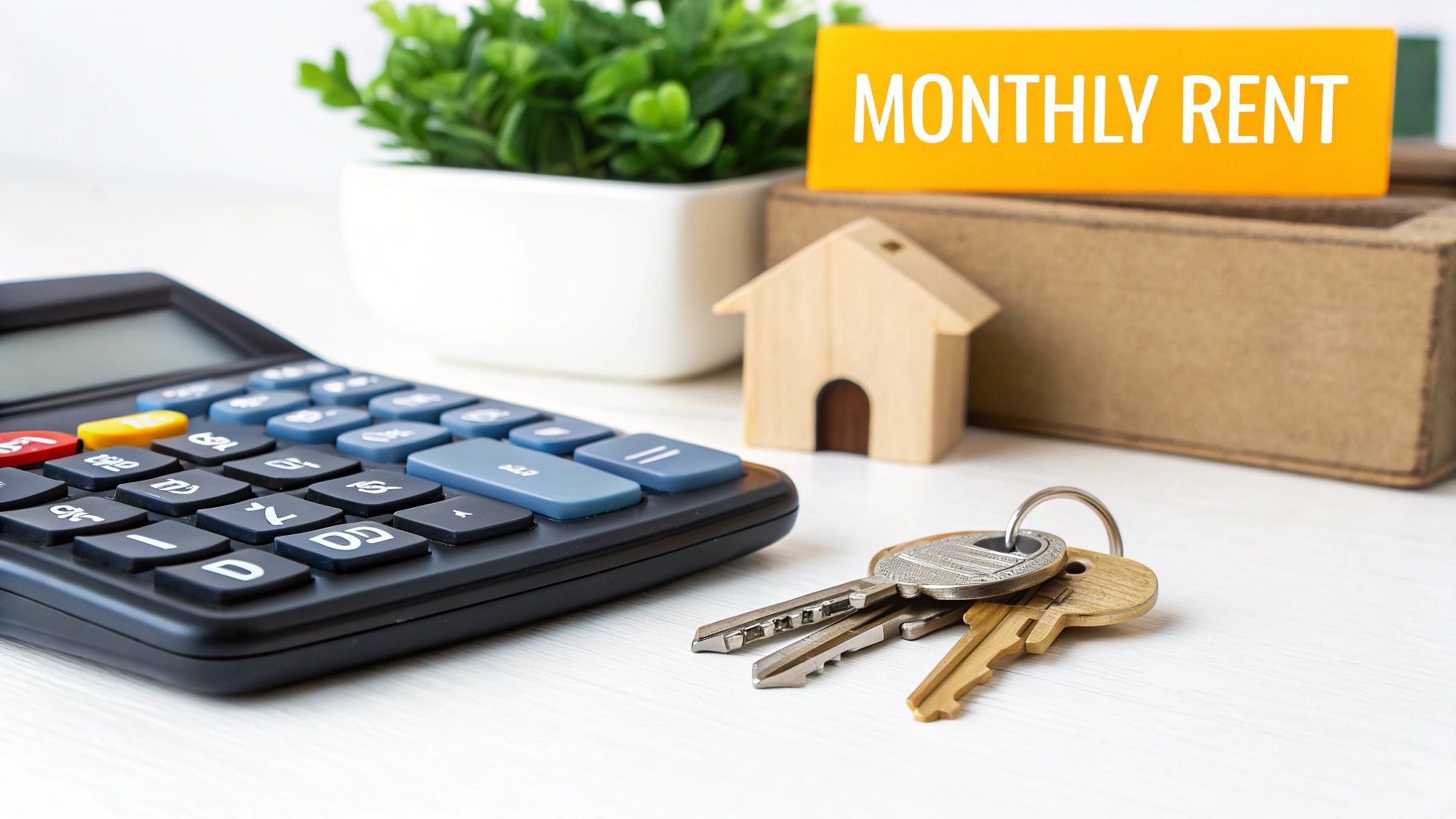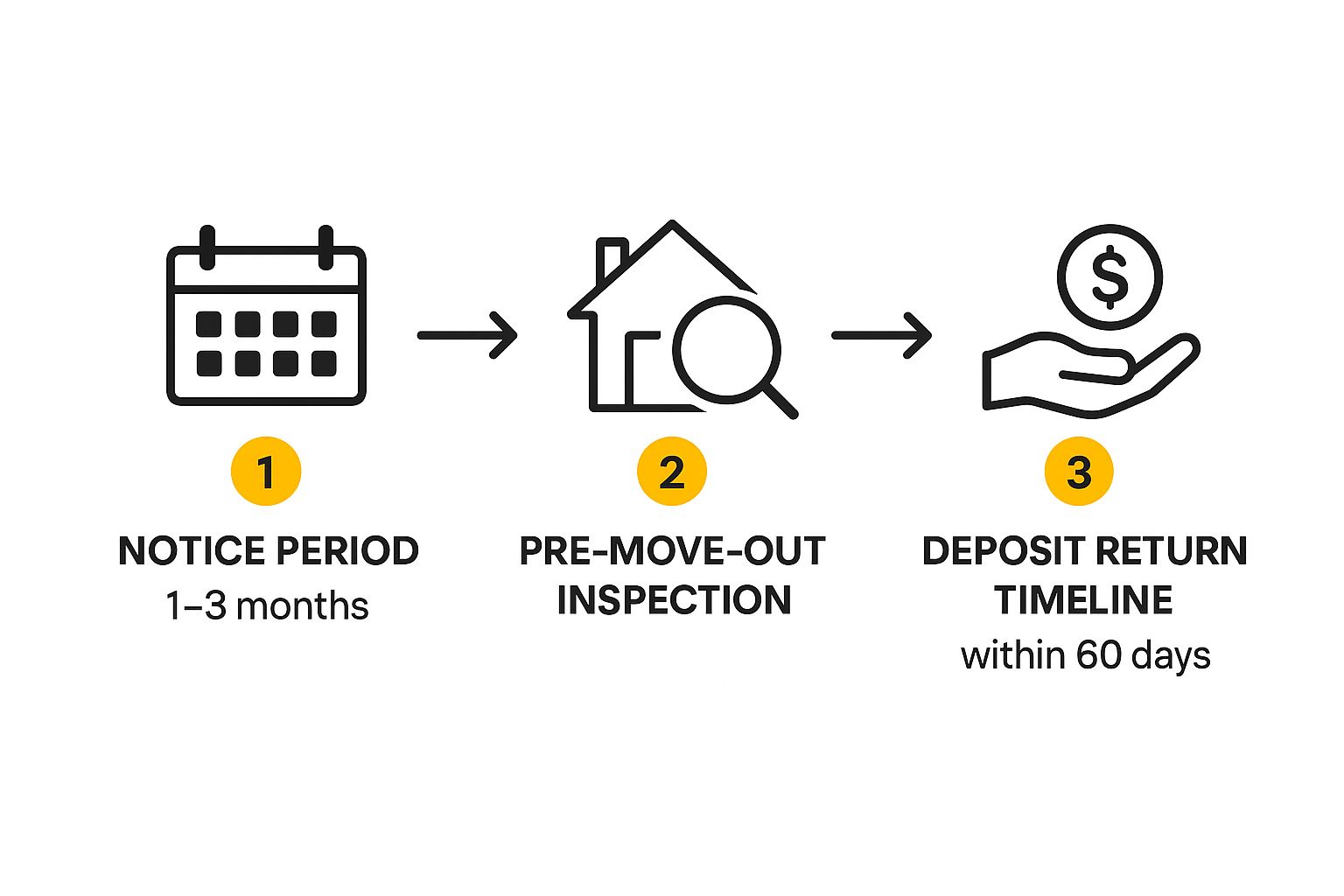In Morocco, the rental relationship between a landlord and a tenant is built upon one single, critical document: the contrat de bail, or lease agreement. This isn't just a piece of paper; it's the official rulebook that clearly lays out the rights and responsibilities for everyone involved, creating a secure and transparent tenancy from day one. Think of it as your best defence against potential misunderstandings over rent, repairs, or how the property can be used.
What Exactly Is a Moroccan Contrat de Bail?
Imagine trying to build a house without a blueprint. You might have a general idea of what you want, but the final result would be chaotic and unstable. A contrat de bail is that essential blueprint for a rental agreement. It takes all the verbal handshakes and assumptions and turns them into a solid, legally recognised framework that protects both the landlord and the tenant.
The main goal here is to establish absolute clarity. So many rental disputes come down to a simple "he said, she said" scenario. For instance, who's on the hook for a leaky tap? Is the tenant responsible for small fixes, or is that the landlord's job? A properly drafted lease removes that grey area by spelling out these duties right from the start.
Why You Should Never Settle for a Verbal Agreement
Relying on a spoken agreement is a huge gamble because it's nearly impossible to prove in a dispute. The contrat de bail acts as the definitive point of reference for the most common issues that pop up during a tenancy. Its value becomes crystal clear when things get serious.
-
The Security Deposit: Your contract will state the precise amount of the security deposit (dépôt de garantie). Crucially, it will also detail the exact conditions for its full return, stopping landlords from keeping your money for what's just considered normal wear and tear.
-
Paying the Rent: It clearly sets the monthly rent (loyer), the exact due date, and how it should be paid. This simple structure helps ensure payments are made on time and gives the landlord legal standing if the rent is late.
-
Upkeep and Repairs: A good lease draws a firm line between the tenant's duty for minor upkeep and the landlord's responsibility for major structural repairs. This division alone prevents one of the most frequent sources of conflict.
-
Length of the Lease: The agreement locks in the fixed term of the rental (durée). This gives both sides a sense of stability and a clear schedule for either renewing the lease or ending the tenancy.
A formal contrat de bail is more than just a bureaucratic step. It's the most powerful tool you have to protect your investment as a landlord or safeguard your rights as a tenant in Morocco.
Ultimately, this document is guided by Moroccan law, which aims to create a fair balance between the interests of landlords and tenants. Getting to grips with its role is the first, most important step you can take to navigate the rental market with real confidence. It’s a detailed game plan that makes sure everyone knows the rules before play even begins.
How Rental Laws in Morocco Have Evolved

To really get a grip on the stability and protection a modern Moroccan contrat de bail offers, it helps to glance back at its history. The journey from informal, often just verbal, agreements to today’s structured legal framework wasn't accidental. It was a conscious push to bring order and fairness to a rental market feeling the pressure of Morocco's growing cities.
For a long time, rental agreements were a bit like the Wild West. They were mostly governed by broad contract principles, which left a lot of grey areas. This ambiguity often sparked disputes where tenants felt powerless and landlords faced a great deal of uncertainty. It was a system that just couldn't keep up as more and more people moved into urban centres.
The real game-changer was the introduction of a key piece of legislation. This new law was designed to put the landlord-tenant relationship on a more professional footing and make the whole process more predictable for everyone.
The Landmark Law That Changed Everything
The most dramatic shift came with Dahir n° 1-14-18, a law aimed squarely at urban leases. Before it came along, the rules were scattered and inconsistent. This new legislation served as a national playbook, creating one clear set of rules for urban rentals. The idea was to replace handshake deals with legally sound, written contracts that spelled everything out.
This evolution was driven by the government's need to stabilise the housing market in bustling hubs like Casablanca, Rabat, and Marrakech. As these cities expanded, so did the rental sector, making clear regulations an absolute necessity for social and economic stability.
The law brought in several crucial changes that are now the foundation of every modern contrat de bail:
- Standardised Contract Terms: It became mandatory to include essentials like the rent amount and payment dates.
- Defined Lease Durations: The law set clearer guidelines for how long a lease could run, typically establishing renewable terms to give tenants a sense of security.
- Clear Rules for Security Deposits: It put a cap on how much a landlord could ask for as a security deposit, preventing unreasonable upfront costs for renters.
This legal shift wasn't just about more paperwork. It represented a fundamental change in thinking, aiming to build a rental market on a foundation of transparency, fairness, and mutual respect—all backed by the law.
Impact on Today's Rental Market
The ripple effects of this legal evolution are plain to see in today's rental scene. A 'contrat de bail' is no longer just a simple agreement; it's a regulated document that carries real legal weight. The 2014 law was pivotal in harmonising landlord-tenant relations by setting clear, enforceable standards.
In fact, according to the Moroccan Ministry of Urbanism and Housing, by 2023, around 60% of officially registered urban housing contracts were following these new rules. This shows a massive increase in formal oversight and protection for tenants. The reform also capped security deposits for unfurnished properties at a maximum of two months' rent, a critical move to make housing more accessible. You can explore more about this transformative housing legislation and its impact.
This structured approach is a direct response to the high rental demand in cities, where nearly 45% of households rent their homes. By formalising the entire process, the law cuts down on potential disputes and provides a clear legal avenue for resolving them when they do pop up. It makes sure both landlords and tenants know their rights and responsibilities from day one, nurturing a more stable and trustworthy rental market for everyone involved.
What Makes a Moroccan Lease Legally Binding?
Think of a Moroccan contrat de bail not just as a piece of paper, but as the foundational blueprint for your entire tenancy. To hold up in court and protect everyone involved, this document needs to include several essential elements. Leaving one out is like building a house without a cornerstone—the whole thing can become unstable when disagreements arise.
When you know what to look for, you can read a lease with confidence. You'll be able to spot red flags and make sure the agreement you're about to sign is solid, fair, and in line with Moroccan law. Each clause has a job to do, and together they create a clear set of rules for both the landlord and the tenant.
This isn't just about ticking boxes. Every component defines a crucial part of the rental relationship, from who's involved and what’s being rented to the financial terms that govern it.
Pinpointing the People and the Place
The very first thing any valid contrat de bail must do is clearly identify who is renting and what is being rented. This might sound like a no-brainer, but any vagueness here can invalidate the entire agreement. The contract has to spell out the full legal names and addresses of both the landlord (bailleur) and the tenant (locataire).
Just as crucial is a detailed description of the property itself. A simple street address isn't enough. A good lease will specify details like the apartment number, the floor it’s on, and any extras that come with it, such as a designated parking spot or a basement storage unit (cave). Getting this right from the start avoids any confusion later on about exactly what you’re paying for.
Think of these details as the bedrock of your contract. Without a clear, accurate identification of the parties and the property, everything else in the agreement—no matter how well-drafted—sits on a shaky foundation.
You'll also want to see an état des lieux, which is basically an inventory and condition report. This document, usually attached as an appendix, records the exact state of the property when you move in. It’s your best protection against unfair damage claims when you move out, and it also protects the landlord if actual damage occurs.
Setting the Financial and Time-Based Rules
With the "who" and "what" sorted, the contract must lay out the financial commitments and the timeline. These terms are the engine of the lease agreement, and they're often where disputes start if they aren't crystal clear. A properly drafted contrat de bail will define these details precisely, leaving no room for guesswork.
The table below highlights the non-negotiable components that must be in every lease. Missing any of these can expose you to legal risks and unnecessary conflict down the road.
Essential Components of a Moroccan Lease Agreement
This table outlines the mandatory information that must be included in a 'contrat de bail' to ensure it is legally compliant in Morocco.
| Clause | Description | Why It's Critical |
|---|---|---|
| Lease Duration (Durée) | The specific start and end dates of the tenancy. Moroccan law often defaults to standard renewable terms for residential leases. | This provides stability and sets a clear timeline for renewal talks or termination notices. |
| Rent Amount (Loyer) | The exact monthly rent, the payment due date, and the acceptable payment methods (e.g., bank transfer, cash). | It prevents any arguments over payment amounts or timing. This is the tenant's primary financial obligation. |
| Security Deposit (Dépôt de Garantie) | The amount paid upfront by the tenant to cover potential damages. This is legally capped, typically at two months' rent for an unfurnished home. | Protects the landlord's property while also protecting the tenant from excessive upfront demands. The contract must also state the conditions for its return. |
| Additional Charges (Charges Locatives) | A breakdown of any extra recurring costs the tenant must cover, like building maintenance fees or communal electricity. | This ensures you know the total monthly cost and avoids surprise bills from the landlord. |
At the end of the day, a well-written contrat de bail is your best tool for a smooth tenancy. By making sure these fundamental components are present and clearly defined, you’re creating a legally sound document that protects your rights, clarifies your responsibilities, and sets the stage for a positive rental experience in Morocco.
Understanding Rent Prices and Regulations

The rent, or loyer, is the financial heart of any contrat de bail, but setting that price isn't a free-for-all. Moroccan law steps in to ensure fairness, especially in booming cities where the demand for housing can be intense.
This legal oversight is there for a reason: it protects tenants from sudden, outrageous price hikes while still allowing landlords to see a fair return on their investment. Getting to grips with these rules is essential for knowing if your rent is fair and what to expect when it's time for an increase.
Navigating High-Demand Rental Zones
In Morocco's major urban hubs, the government has pinpointed specific high-demand areas, called zones tendues, to keep the rental market from spiralling out of control. Think of them as special zones for rent management, covering bustling centres like Casablanca and Rabat where finding a good flat can feel like a competitive sport.
In these zones, a landlord can’t just pull a number out of thin air. The rent for any new lease has to be in line with a loyer de référence, or reference rent. This benchmark isn't arbitrary; it's carefully calculated based on a few key factors to make sure the price reflects the property’s real value, not just market hype.
- Property Type: The size and style of the home (e.g., apartment vs. villa).
- Location: The specific neighbourhood and its perks.
- Building Age: When the property was originally built.
- Number of Rooms: The total count of main living spaces.
This system brings a much-needed layer of predictability and stability to the rental scene, stopping landlords from setting sky-high prices from day one and making housing that little bit more accessible.
A key takeaway is that the 'loyer de référence' acts as a guideline to anchor the initial rent in a contrat de bail, ensuring it starts from a fair and legally recognised baseline in high-demand areas.
How Rent Increases Are Legally Capped
The rules don’t just stop with new leases. They also put a tight leash on how much the rent can be increased when a lease is renewed. A landlord can't just decide to raise the rent on a whim; any increase needs to be properly justified and follow a clear legal framework.
Rent pricing in Morocco under a contrat de bail is really a blend of government rules and market dynamics. For example, Casablanca has seen average annual rental increases of around 5-7% over the past five years. But even these adjustments are often capped by law, especially in zones tendues. Here, leases must stick to both a loyer de référence and a loyer de référence majoré (a maximum allowable rent).
To put it in perspective, a 70-square-metre flat in central Casablanca with a median rent of 6,000 MAD in 2023 couldn't be rented for more than roughly 6,900 MAD, even after permitted adjustments for improvements. This structure strikes a balance between protecting tenants and encouraging landlord investment.
Justifying Rent Adjustments for Improvements
There is a way for landlords to legally increase the rent beyond the standard caps, but it’s reserved for specific situations. If a landlord carries out significant work to improve the property—we’re talking a brand-new kitchen, a modern heating system, or an extra bathroom—they can then propose a rent increase.
This isn’t an automatic right, though. The work must genuinely add value and improve the tenant’s quality of life. A simple coat of paint or fixing minor wear and tear won't cut it. The proposed increase has to be reasonable and directly related to the cost of the upgrades.
It's also worth remembering that on top of rent, tenants are responsible for certain local taxes. You might find our guide on the taxe d'habitation in Morocco helpful for understanding all your financial obligations.
This provision achieves a crucial balance. It shields tenants from paying more for routine maintenance while giving landlords a solid incentive to invest in their properties, which ultimately lifts the quality of the entire housing market.
Tenant and Landlord Responsibilities

A good tenancy is a partnership. When both sides know their part, things tend to go smoothly. In Morocco, a contrat de bail is much more than a rent receipt; it's a legal framework that spells out the duties for both the landlord and the tenant. Getting this right from the start is the key to preventing small misunderstandings from spiralling into serious disputes.
Think of it as a two-way street. The landlord provides a safe and liveable home, and in return, the tenant cares for the property and pays their rent on time. This balance, defined by law, is what makes for a stable and stress-free rental experience.
It’s not just about ticking legal boxes. Understanding these roles fosters respect and creates a solid foundation for the tenancy. Let’s break down exactly what’s expected of each party.
The Tenant's Core Obligations
As a tenant, your responsibilities really boil down to three things: paying your way, looking after the place, and being a good neighbour. These aren't just suggestions; they are legal duties baked into your contrat de bail.
First and foremost is paying the rent. It’s the most fundamental part of the deal, and it must be paid on the agreed-upon date, every time. Falling behind consistently can lead to legal headaches and even eviction, so it’s crucial to take this obligation seriously.
Beyond the finances, you're the day-to-day custodian of the property. This means you’re on the hook for routine upkeep and any minor repairs that pop up.
- Routine Maintenance: Think of the simple stuff—changing a lightbulb, keeping drains clear, and generally maintaining a clean living space.
- Minor Repairs: You’re expected to handle small fixes yourself, like tightening a loose door handle or fixing a dripping tap.
- Reporting Major Issues: If something big goes wrong, like a serious leak or an electrical problem, you must tell the landlord right away. Quick reporting can prevent a small issue from becoming a disaster.
Finally, you need to use the property responsibly. This means following any building rules, especially regarding noise, and making sure you’re not causing a nuisance to your neighbours.
The Landlord's Legal Duties
The landlord's role is centred on one main principle: providing a property that is safe, secure, and genuinely liveable. This duty starts before you even get the keys and lasts for the entire tenancy. Moroccan law ensures tenants are renting a functional home, not just four walls.
The landlord’s most important job is to hand over a property that’s in good shape and meets all health and safety standards. All the essentials—plumbing, electricity, and the building's structure—must be in proper working order from day one.
Under Moroccan law, a landlord simply cannot rent out a property that is uninhabitable. The contrat de bail carries an implicit guarantee that the home is fit to live in, a right known as the 'obligation de délivrance'.
Throughout the lease, the landlord is also responsible for all major repairs and structural maintenance. This is where the line is drawn between their duties and the tenant's. If the roof starts leaking or the boiler gives out, that’s the landlord’s problem to fix and pay for.
Just as important is the landlord’s duty to respect your privacy and your right to "peaceful enjoyment" of your home. They can't just show up and let themselves in. Except for a true emergency, they must get your permission before entering the property.
Comparing Responsibilities Side-by-Side
To lay it all out clearly, this table gives you a straightforward comparison of the main legal duties for both parties under a typical Moroccan contrat de bail.
Landlord vs Tenant Responsibilities in Morocco
| Responsibility Area | Tenant's Obligation | Landlord's Obligation |
|---|---|---|
| Financials | Pay the full rent and charges on time as specified in the lease. | Provide receipts for all payments and manage the security deposit according to legal guidelines. |
| Property Maintenance | Handle minor, everyday repairs (e.g., replacing fuses, unblocking sinks). Keep the property clean. | Manage and fund all major structural repairs (e.g., roofing, plumbing, electrical systems). |
| Property Condition | Return the property in the same condition as received, allowing for normal wear and tear. | Deliver a safe, clean, and habitable property at the start of the lease. Ensure it meets all legal standards. |
| Access & Privacy | Allow the landlord access for necessary repairs, with prior notice. | Respect the tenant's right to privacy and not enter the property without permission, except for emergencies. |
When this division of labour is clear, both landlords and tenants can act with confidence. It creates a relationship built on mutual respect and a shared understanding of the rules.
How to Navigate Lease Termination and Renewal
Every rental agreement eventually comes to an end. Whether that transition is a smooth handover or a point of contention often boils down to one thing: following the proper legal steps. Navigating the end of your contrat de bail requires a clear grasp of the rules for both termination and renewal, which keeps the process fair and predictable for everyone.
Think of your lease term as a journey with a set destination. You can't simply hop off the train whenever you feel like it; you have to signal your intent to exit at the right time. That signal is the formal notice period, or préavis—a critical step that gives both parties enough time to prepare for the change.
Giving Notice The Right Way
For tenants, deciding to move on involves more than just packing. You are legally required to give your landlord written notice, and this isn't just a casual heads-up. The notice must be sent via registered mail with an acknowledgement of receipt (lettre recommandée avec accusé de réception). This creates an official, verifiable record of when you sent it and when they received it.
The standard notice period for a tenant usually falls between one and three months before you plan to leave. Your first port of call should always be your contrat de bail, as it will specify the exact timeframe. Overlooking this step is a costly mistake, as you could be on the hook for rent even after you've moved out. Respecting this timeline is key to a clean break.
A quick chat or an email simply won’t cut it legally. The formal written notice is your official declaration and your best protection against any potential financial claims later on.
Landlord’s Reasons for Non-Renewal
On the flip side, a landlord can't end a tenancy on a whim. Moroccan law is quite specific about the valid reasons a landlord can have for not renewing a lease, which protects tenants from being arbitrarily kicked out. These reasons typically fall into a few justifiable categories:
- Personal Use: The landlord plans to move into the property themselves or house a close family member (like a parent or child).
- Sale of the Property: The landlord intends to sell. In many situations, the law gives the current tenant the first right of refusal to buy it.
- Legitimate and Serious Reasons: This is a bit of a catch-all, but it covers things like major renovations that would make the property unlivable or a tenant repeatedly failing to meet their obligations, such as consistently paying rent late.
Landlords also have to follow strict notice periods, which can be as long as six months. This gives the tenant a fair amount of time to find a new place to live. If you're looking for stability, understanding the dynamics of longer agreements can be incredibly helpful. You can explore more on this by checking out the options for long-term rentals in Morocco.
This visual helps lay out the key stages of ending a tenancy, from giving notice all the way to getting your deposit back.

As the infographic shows, the entire process is built on specific timelines. Sticking to these legal deadlines is what ensures a smooth transition and, importantly, the timely return of your security deposit.
Common Questions About the Contrat de Bail
When you’re dealing with a Moroccan rental agreement, it's natural for questions to pop up. Getting straight answers is the best way to feel secure in your tenancy, so let’s tackle some of the most common uncertainties about the contrat de bail.
Sorting out these issues from the start helps everyone avoid simple misunderstandings that can spiral into bigger problems. Whether we're talking about registration or rent reviews, knowing where you stand is half the battle.
What Happens If My Lease Is Not Registered?
Think of an unregistered contrat de bail as a handshake agreement. It's still valid between you and the landlord, but it lacks official legal muscle. Registration provides concrete proof of your agreement's terms, which becomes incredibly important if a dispute over rent or tenancy length ever ends up in court.
The landlord is the one responsible for getting the lease registered, and they can face penalties if they don't. For you as a tenant, a registered lease is your shield—it gives you a much stronger legal position and peace of mind.
Can a Landlord Increase My Rent Arbitrarily?
Absolutely not. Landlords in Morocco can't just decide to raise the rent on a whim. The law is quite strict on this. Any increase is typically only allowed when the lease is up for renewal, and even then, it has to follow legal limits, especially in high-demand cities known as zones tendues.
The possibility of a rent review has to be written directly into your contrat de bail. A landlord can't legally spring a surprise mid-lease rent hike on you. This is designed to give you financial stability.
Any increase must be reasonable and stick to the official guidelines. This protects you from sudden, budget-breaking changes to your living costs. For a deeper dive into these kinds of details, check out our guide on what they don't tell you about renting in Morocco.
How Can I Ensure My Security Deposit Is Returned?
Getting your security deposit, or dépôt de garantie, back really comes down to one thing: returning the property in the same shape you found it, minus normal wear and tear. This is all checked during the final walk-through, known as the état des lieux de sortie.
If everything looks good and no major damages are found, the landlord is legally obligated to return your full deposit within a set period, usually one to two months. If they do deduct money for repairs, they have to back it up with actual invoices. Your best defence here is to take plenty of photos when you move in and again when you move out. It’s hard to argue with photographic evidence.
Navigating the Moroccan property market is much easier with an expert in your corner. At Rich Lion Properties, we offer clear, practical advice to make sure your rental experience is a positive one. Whether you're a tenant or a landlord, we're here to help you make sense of your contrat de bail and protect your interests. Visit us at https://richlionproperties.com to learn more.



